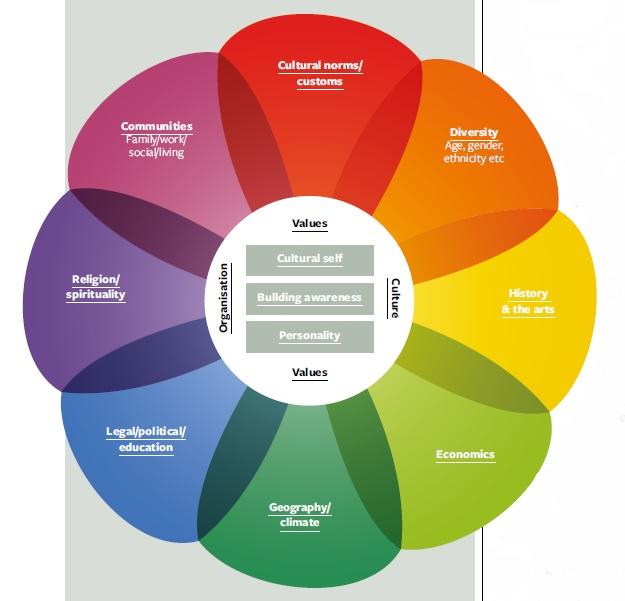The world and its institutions are extraordinarily complex. So they require us to avoid binary decisions and the ‘black and white thinking’ that emerges from unconscious bias and leads to stereotyping.
In a coaching relationship, it is important to hold space for potentially conflicting values and beliefs. Opposing viewpoints can be powerful in eliciting a ‘both/and’ perspective – one that has the potential to encourage creativity and ‘innovation of thought’ in multicultural teams and global organisations.
I coach leaders – often remotely – who are moving around the world, or working in multicultural teams. Based on my work and the research I did during my masters degree in coaching and mentoring, I have developed an approach to operating in an intercultural context that is rooted in the following five key elements:
1. Explore the impact of your own cultural influences
Look at yourself first. Reflect upon who you are, based upon where you were born, the messages you received from family or society, and your reaction to them. Analyse how these might have changed during your life, taking into account the multicultural influences you may or may not have experienced.
Once this reflective work has begun, contemplate. When, where and from whom did you learn what you consider to be your ‘cultural norms’? What are your cultural values?
2 Learn the intercultural theory… and then put it to one side
The intercultural theorists, notably Edward T Hall, Geert Hofstede, Charles Hampden-Turner and Fons Trompenaars, have all contributed enormously to the field of cultural awareness. Yet research suggests they may have also contributed to ‘sophisticated stereotyping’.
We need to understand the cultural norms of the people we are coaching, the context in which they work, and the people they work with. Yet we also need to bracket this awareness so that we enter into any coaching from an unbiased perspective.
This requires holding opposing values at bay in a ‘neutral space’ that is characterised by suspended judgements. Do you practise this?
3. Realise that concepts of ‘self’ differ across cultures
There are fundamental differences around the world about how we think of ourselves. A person tending to construe himself or herself as an independent individual, or as an interdependent member of a group, is culturally bound.
Studies show that that the Western ‘self’ concept is thought of as autonomous, independent and individualistic, whereas the Eastern ‘self’ concept is collective and interdependent. This means that goals will be viewed differently.
An individualistic approach will be concerned with individual achievement, whereas a collective approach will be concerned with the good of the team, community, organisation or society.
Some cultures and traditions do not even acknowledge the existence of a ‘self’ and engage in spiritual practice to minimise the interference of self. How much of your cultural self do you bring into the coaching relationship?
4. Understand that universal ‘truths’ are false
One of the key reasons for many misunderstandings across cultures is the false assumption that we are all the same. While ‘unity’ is an admirable ambition, it is probably an impossible one.
We are not all the same. Conversely, we are all different. Yet, there are characteristics or tendencies shared by cultural groups that are exhibited by cultural norms.
Moreover, although we all might be striving for a universal concept, such as happiness, how we wish to achieve it differs across cultures. Not only that, there are different rules for the expression of concepts that are thought to have universal meaning – like happiness, again.
For example, smiling is not trusted in some cultures. How much, then, are you challenging your own assumptions?
5. Think about the external influences that have impacted you over your lifespan. Then contemplate those that have most contributed to your sense of identity
Too often we tend to think of culture as being something exhibited by everyone from the same collective, such as an entire country. This then leads to stereotyping and bias.
Actually, there are many outside influences that contribute to our ‘cultural self’, including communities, economics, education, politics, the legal system, and religious or spiritual beliefs. Even the climate contributes to our cultural sense of self.
(For example, my husband, who was born in the tropics, says that he does not truly feel at one with himself in anything less than 20°C).
If you grew up strongly influenced by the history of your country, how does that now affect your relationship with your home or host nation? Other subtle influences may have come from your environment or education.
For example, if you were educated in a system characterised by rote learning, you may not be as assertive in the workplace as someone who was educated to self-disclose. How would it be for you if you were to contemplate your own cultural influences, as distinct from anyone else’s?
Ultimately, it is only once we have done the necessary work on ourselves that we are truly ready to work with people from different cultural backgrounds.
THE CROSS-CULTURAL KALEIDOSCOPE

I developed the Cross-Cultural Kaleidoscope, which takes a systems approach to coaching, in order to identify the influences that combine to shape a person’s cultural identity, a concept that has been named the ‘cultural self’.
It has been researched using a phenomenological approach, and is concerned with ‘meaning making’. The kaleidoscope provides a basis for exploring, at both a macro and a micro level, the impact of past-life experiences on an individual.
These experiences include communities, cultural and societal norms, diversity, education, economics, history, religious and spiritual beliefs, as well as geography to ‘bring the outside in’. This model provides a structure to question how these external ‘lenses’ may have contributed to a person’s cultural self, right now in the current context.
It then identifies how these influences may have changed – or perhaps could change – across the individual’s lifespan.
Jenny Plaister-Ten is a Fellow of the Institute of Leadership & Management. She runs her own intercultural coaching and leadership development practice, 10 Consulting, and is author of The Cross-Cultural Coaching Kaleidoscope
The Cross-Cultural Kaleidoscope diagram is the intellectual property of Jennifer Plaister-Ten and 10 Consulting Ltd – © 10 Consulting Ltd, 2016
For further thoughts on cross-cultural issues, check out these learning resources from the Institute
This article was taken from the Autumn 2017 edition of Edge magazine.
Edge is the quarterly magazine exclusive to members of the Institute. To become a member and receive your copy, click here.

